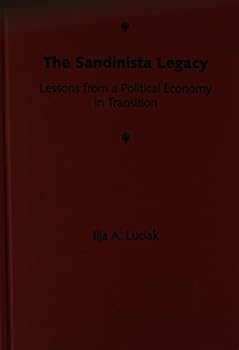The Sandinista Legacy: Lessons from a Political Economy in Transition
"An original and carefully crafted piece of work. . . . Scholars and analysts working on Nicaragua will want this book."--Rose J. Spalding, DePaul University "Important contributions not only to the comparative literature of regime transitions (particularly 'post-socialist' transitions), but also to the study of Nicaragua and Central America. . . . Presents a nicely balanced picture of the Sandinista record of accomplishments and failures, including a well-reasoned analysis of who or what was to blame for the failures."--Richard Tardanico, Florida International University When the Sandinistas came to power in Nicaragua, they promised to establish social and economic democracy. As Ilja Luciak tells us in this study of regime transitions, their legacy is mixed, though they deserve credit for institutionalizing electoral democracy. While they improved the life of the peasantry and achieved an impressive record in the areas of education and health, by 1990 their progress had been halted and in many instances reversed. Luciak maintains that the Sandinistas' loss at the polls in 1990 was a blessing in disguise: after eleven years in power, the revolutionary movement needed time to rejuvenate itself and return to its popular roots. He examines the evolution of Sandinista democracy and analyzes Sandinista policies toward two rural grassroots movements, the Association of Rural Workers and the National Union of Farmers and Ranchers, showing the inevitable tension that results when a vanguard party attempts to strengthen participatory democracy. He also examines the development of the tiendas campesinas By focusing on the dilemma that confronts societies in transition, Luciak shows that the Sandinista experiment offers a valuable warning for the political elites and for the people of Eastern Europe and the successor states of the Soviet Union. The lesson is that the Sandinistas set out to establish a new model of democracy that emphasized economic justice and direct democracy; it wound up consolidating formal democracy. The price for the consolidation of formal democracy is paid by the poor majority, he says, and it is often too high. Ilja A. Luciak is associate professor of political science at Virginia Polytechnic Institute and State University. He has published articles in such journals as Comparative Politics, Journal of Latin American Studies, and Latin American Perspectives.
Format:Hardcover
Language:English
ISBN:0813013690
ISBN13:9780813013695
Release Date:June 1995
Publisher:University Press of Florida
Length:258 Pages
Weight:1.30 lbs.
Dimensions:0.9" x 6.4" x 9.3"
Customer Reviews
1 rating
A Worthwhile Read
Published by Thriftbooks.com User , 24 years ago
This is an insightful book by an author with extensive first-hand knowledge of Nicaragua before, during, and after the Sandinista regime. This book deals extensively with issues of democracy at various levels of the Sandinista government including grassroots and mass organizations, the party, and the country as a whole. Dr. Luciak also deals extensively with the issue of agrarian reform and how Sandinista policy vaccilated as a result of the internal contradictions in the Sandanista policies of National Unity and Popular Hegemony. Finally, the book looks critically at the role the United States played in the counterrevolution and, as the title would indicate, the legacy that eleven years of socialist rule by the Sandinistas left on Nicaraguan society and its political institutions. This legacy includes the first fair electoral system in Nicaragua's history and the strengthening of other democratic institutions.





